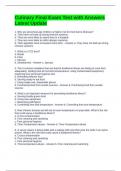-
1. Exam (elaborations) - 7th grade culinary arts final exam study guide questions and answers
-
2. Exam (elaborations) - Advanced culinary arts final study guide questions with latest update
-
3. Exam (elaborations) - Advanced culinary arts test exam questions and answers
-
4. Exam (elaborations) - Basic culinary skills final exam questions with latest update
-
5. Exam (elaborations) - Cula 101 introduction to culinary arts final study guide exam questions with latest u...
-
6. Exam (elaborations) - Culinary 2 final exam questions with verified answers
-
7. Exam (elaborations) - Culinary 2 final exam review questions with verified answers
-
8. Exam (elaborations) - Culinary arts 1 exam study guide questions and answers
-
9. Exam (elaborations) - Culinary arts 1 final exam questions and answers
-
10. Exam (elaborations) - Culinary arts 1- final exam review cmhs questions and answers
-
11. Exam (elaborations) - Culinary arts 1- final review exam questions and answers
-
12. Exam (elaborations) - Culinary arts 1a final review exam questions with correct answers
-
13. Exam (elaborations) - Culinary arts 2 final exam review questions and answers
-
14. Exam (elaborations) - Culinary arts 3 - midterm exam review questions with correct answers
-
15. Exam (elaborations) - Culinary arts 3 final exam questions and answers
-
16. Exam (elaborations) - Culinary arts and hospitality final exam review questions and answers
-
17. Exam (elaborations) - Culinary arts certification exam questions and answers
-
18. Exam (elaborations) - Culinary arts exam 2 questions with complete solutions
-
19. Exam (elaborations) - Culinary arts exam 3 questions with correct answers
-
20. Exam (elaborations) - Culinary arts exam questions and answers 2024
-
21. Exam (elaborations) - Culinary arts exam questions and answers latest update
-
22. Exam (elaborations) - Culinary arts exam questions with verified answers latest update
-
23. Exam (elaborations) - Culinary arts final exam q & a
-
24. Exam (elaborations) - Culinary arts final exam questions with complete solutions
-
25. Exam (elaborations) - Culinary arts final exam questions with latest update
-
26. Exam (elaborations) - Culinary arts final exam review questions with verified answers
-
27. Exam (elaborations) - Culinary arts final exam study guide exam questions with correct answers
-
28. Exam (elaborations) - Culinary arts final exam study guide questions and answers
-
29. Exam (elaborations) - Culinary arts food safety exam questions and answers
-
30. Exam (elaborations) - Culinary arts test 4 questions with correct answers
-
31. Exam (elaborations) - Culinary arts t2 exam questions and answers
-
32. Exam (elaborations) - Culinary arts state written test practice exam questions with correct answers
-
33. Exam (elaborations) - Culinary arts state test review exam questions with correct answers
-
34. Exam (elaborations) - Culinary arts skillsusa exam questions with correct answers
-
35. Exam (elaborations) - Culinary arts semester exam 1 questions and answers
-
36. Exam (elaborations) - Culinary arts safety test questions and answers
-
37. Exam (elaborations) - Culinary arts quiz exam questions and answers
-
38. Exam (elaborations) - Culinary arts mid term exam study guide questions with correct answers
-
39. Exam (elaborations) - Culinary arts ii practice test exam questions with correct answers
-
40. Exam (elaborations) - Culinary certification exam questions and answers
-
41. Exam (elaborations) - Culinary cte exam questions with latest update
-
42. Exam (elaborations) - Culinary end of program exam questions with latest update
-
43. Exam (elaborations) - Culinary exam practice test exam questions and answers
-
44. Exam (elaborations) - Culinary final exam study guide questions with complete solutions
-
45. Exam (elaborations) - Culinary final exam test with answers latest update
-
46. Exam (elaborations) - Culinary fundamentals culinary science exam questions and answers
-
47. Exam (elaborations) - Culinary fundamentals final exam questions and answers
-
48. Exam (elaborations) - Culinary level 2 final exam questions and answers
-
49. Exam (elaborations) - Culinary theory skills final exam review questions and answers
-
50. Exam (elaborations) - Final exam baking for culinary arts exam questions and answers
-
51. Exam (elaborations) - Final exam culinary arts i exam questions with verified answers
-
52. Exam (elaborations) - Final exam culinary arts questions with complete solutions
-
53. Exam (elaborations) - Foundations of restaurant management & culinary arts 2nd edition level 2 industry fin...
-
54. Exam (elaborations) - Intro culinary arts final exam q & a
-
55. Exam (elaborations) - Intro culinary arts final exam questions with verified answers
-
56. Exam (elaborations) - Intro to culinary arts final exam review questions with complete solutions
-
57. Exam (elaborations) - Intro to culinary arts final exam- semester 1 questions and answers
-
58. Exam (elaborations) - Introduction to culinary arts study guide exam questions and answers
-
59. Exam (elaborations) - Multiple choice culinary arts final exam questions and answers
-
60. Exam (elaborations) - Nc culinary arts & nutrition 1 final exam questions and answers
-
61. Exam (elaborations) - Overall study aafcs culinary arts industry test exam questions and answers
-
Show more




